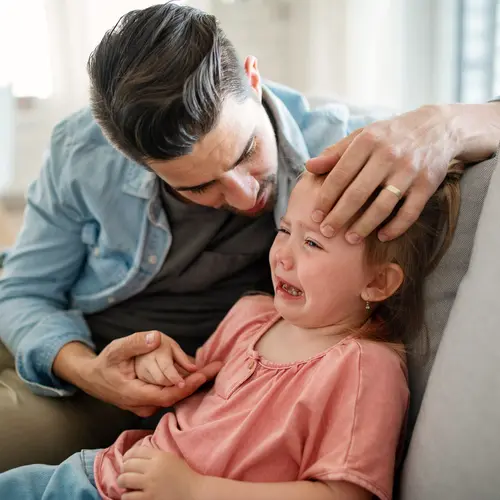Your baby is now 18 months old. How the time flies! What milestones should they have experienced at this age?
Movement Skills (Gross Motor Skills)
Your child should be able to:
- Walk by themselves
- Possibly walk up steps or run
- Squat to pick up a toy
- Pull toys while they are walking
Your child may try to climb out of their crib at this age. If so, put a bell on the crib so you can know when they are doing it and make sure the area in their bedroom is safe and free of items they could fall or stumble upon. Their climbing out of the crib could be a sign that it's time to move into a bed.
Hand and Finger Development (Fine Motor Skills)
Your child should be able to:
- Drink from a cup
- Eat with a spoon
- Stack two objects or blocks
- Help undress themselves
- Hold a crayon and scribble a line
As they near 18 months, it will be easy for them to manipulate an object between their thumb and index finger (like turning a knob or putting a round peg in a hole). You can build on these skills by trying games such as putting large square pegs in matching holes (this is harder than with round pegs because you have to match angles), stacking five or six blocks or taking toys apart and putting them back together. You could also let them feed themselves sometimes, even if it is messy.
Language Skills
Your child should be able to:
- Use 10-25 words
- Say the word "no" and shake their head
- Respond to questions
- Produce speech-like sounds (babbling), maybe singing along to a song in tone, if not words
- Understand the concepts of "in" and "on"
- Repeat some words heard in a conversation
- Point to people when they're named and identify objects in a book
Continue speaking and reading to your child as a way to build their verbal skills. It's not unusual for them to be able to say a few words which no one can understand but their parents. They may also use one word in place of a whole sentence like "up" to mean, "Pick me up!" Being able to speak takes time, so don't be frustrated if they seem to be taking longer than other people's kids. You may find that one day they finally "gets it" and goe from rarely speaking to full sentences.
Social/Emotional Skills
Your child may:
- Like to hand objects to others as play
- Have temper tantrums
- Be fearful around strangers
- Cling to parents or caregivers in new situations
- Show affection to people they know well
- Explore alone, with a parent close by
This is the age when children start to test boundaries. Your child may say "no" to any new situations or start to throw a tantrum to get their own way. What happened to your sweet little girl who did whatever you asked? They are still there, but learning independence -- and part of that is trying to do things their way.
They are also beginning to understand what sharing is (by offering something to someone) although they may decide to take it back immediately. It's up to you as the parent to show them that temper tantrums are not acceptable and give them consequences for inappropriate behavior. But above all, be patient with them as they figure things out.
Learning, Thinking Development (Cognitive Skills)
Your child should be able to:
- Know the uses of ordinary things: a brush, spoon, or chair
- Point to a body part
- Scribble on their own
- Follow a one-step verbal command without any gestures (for instance, they can sit when you tell them to "sit down")
- Play pretend, such as feeding a doll
- Point to show others something interesting
At this stage, kids love games with a "payoff" -- they press a button and some music starts to play, for instance. They'll also love playing with bubbles you've blown for them or repeating nursery rhymes with actions.
Developmental Delays
Tell your doctor if your child can't do any of the following by 18 months:
- Point to show things to others
- Walk
- Imitate others
- Know the uses of ordinary things, like a brush or comb
- Gain new words or speak at least six words
- Notice or mind when you or another caregiver leaves or returns
- Remember skills they used to have
At 18 months, your child should also be tested for autism as well as for general development, according to the American Academy of Pediatrics. This would be particularly important if they show signs of developmental delay.
Screen Time
Children younger than 18 months don't understand that the symbols on a screen represent equivalent objects in the real world, so the American Academy of Pediatrics doesn't recommend kids watch any screens before that age, whether on TV or a tablet.
Children over 18 months can learn from high-quality educational programs, but their parents must watch with them and reteach the lessons. Don't let your child watch screens by themselves.


